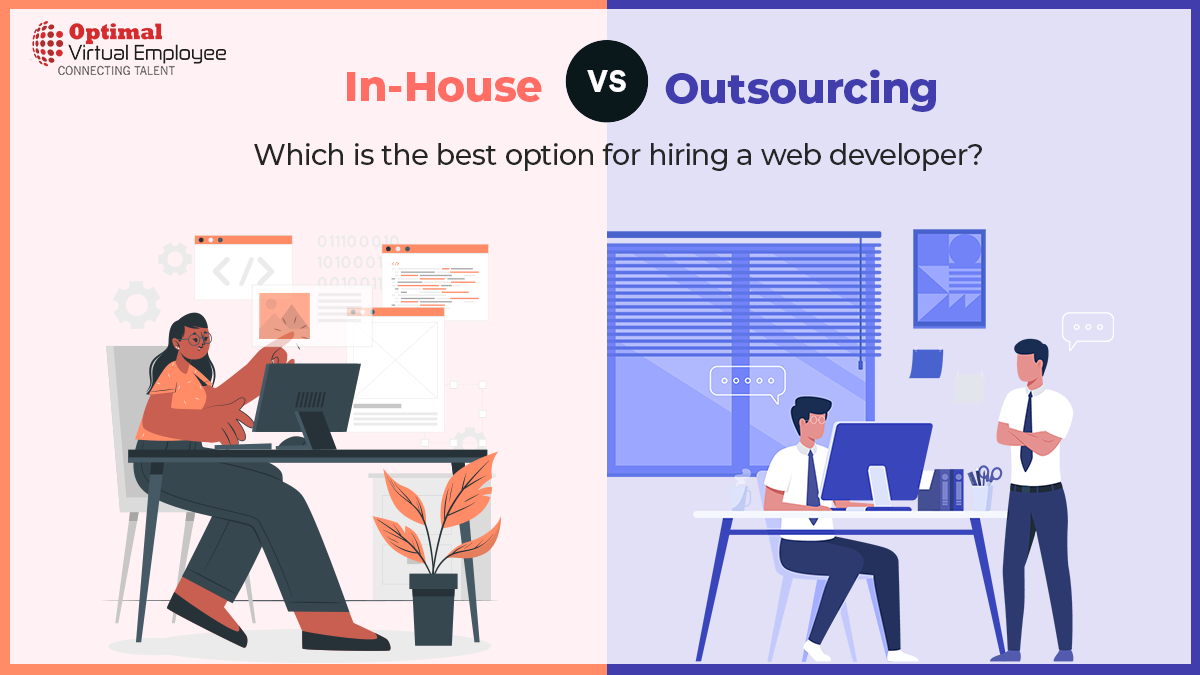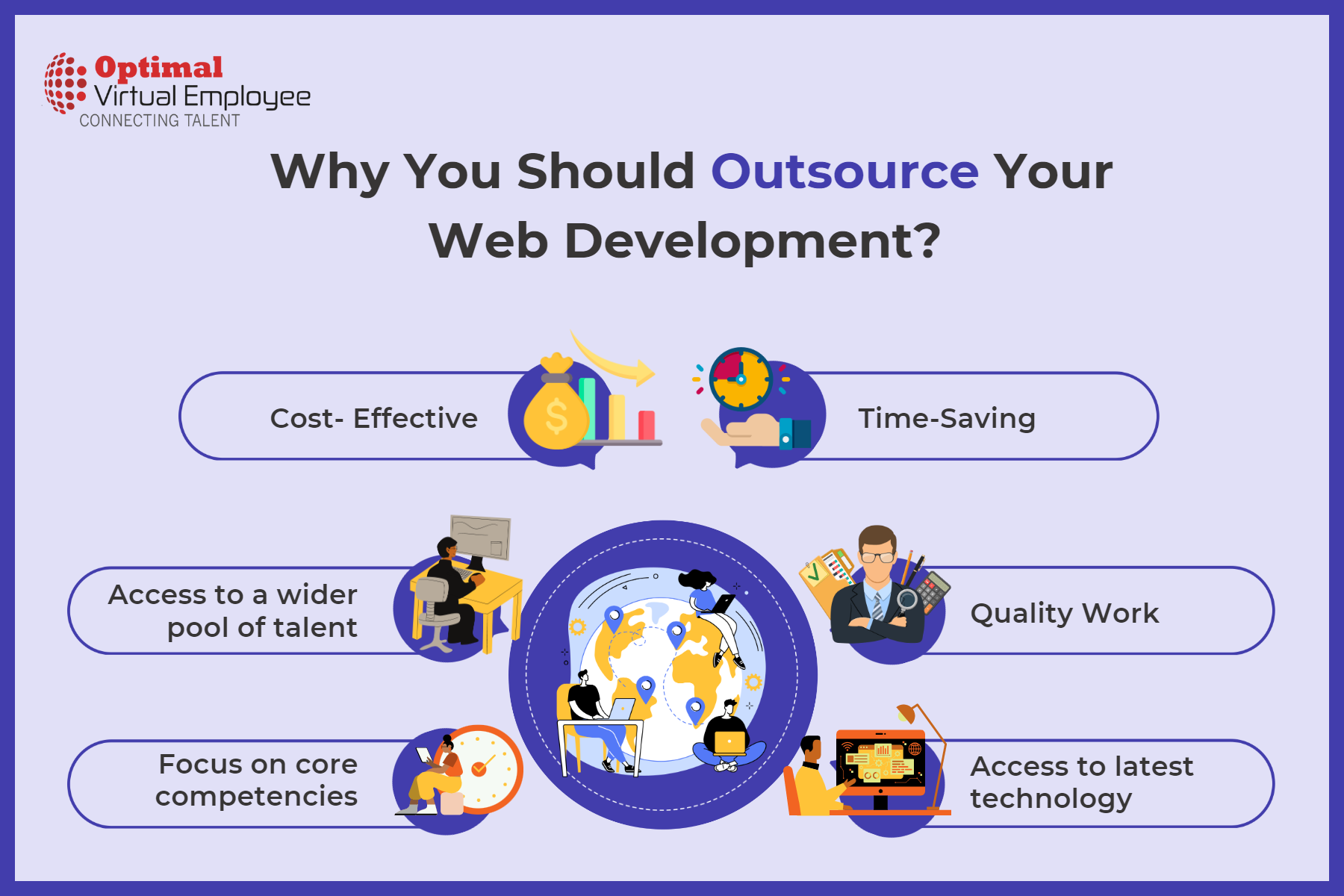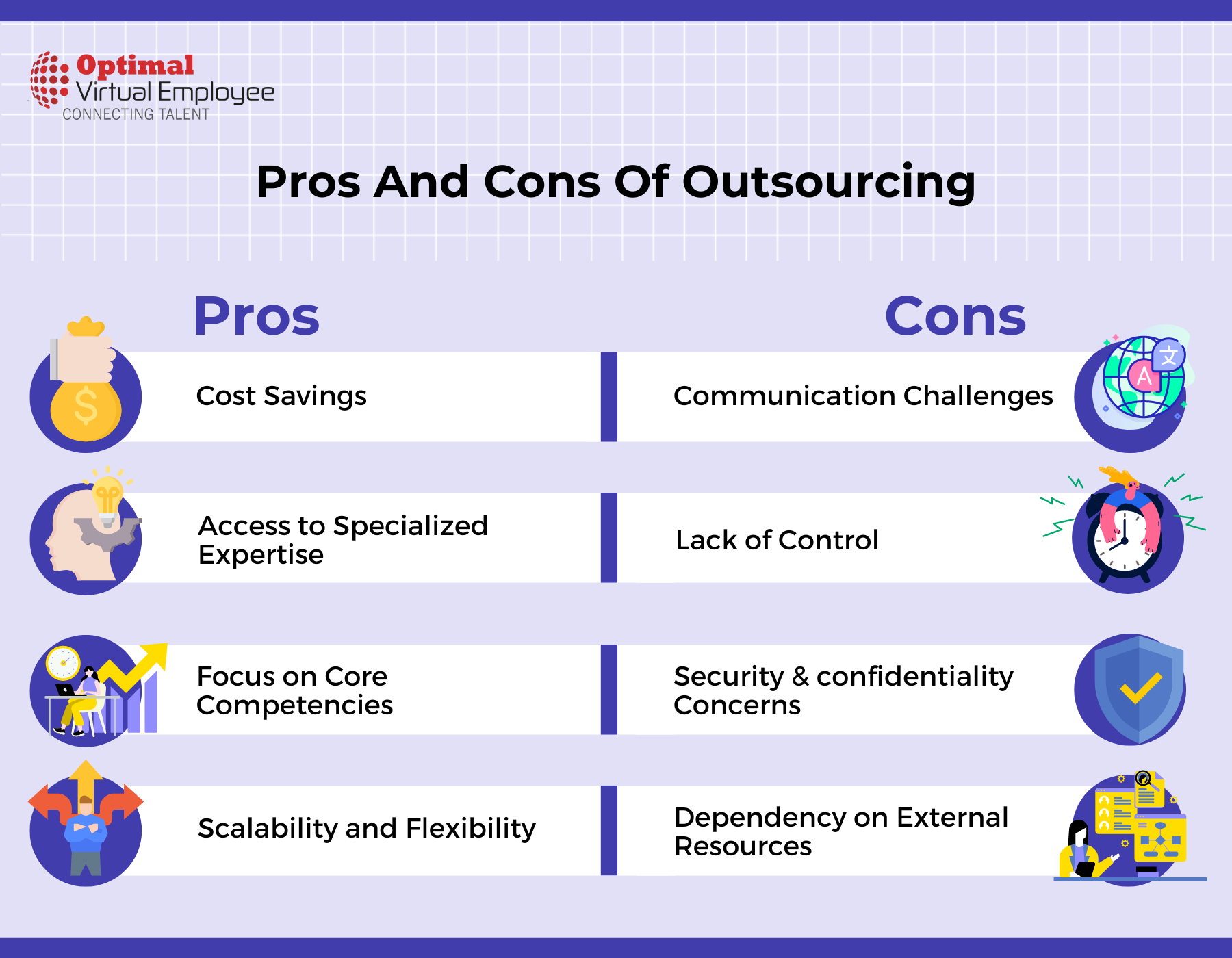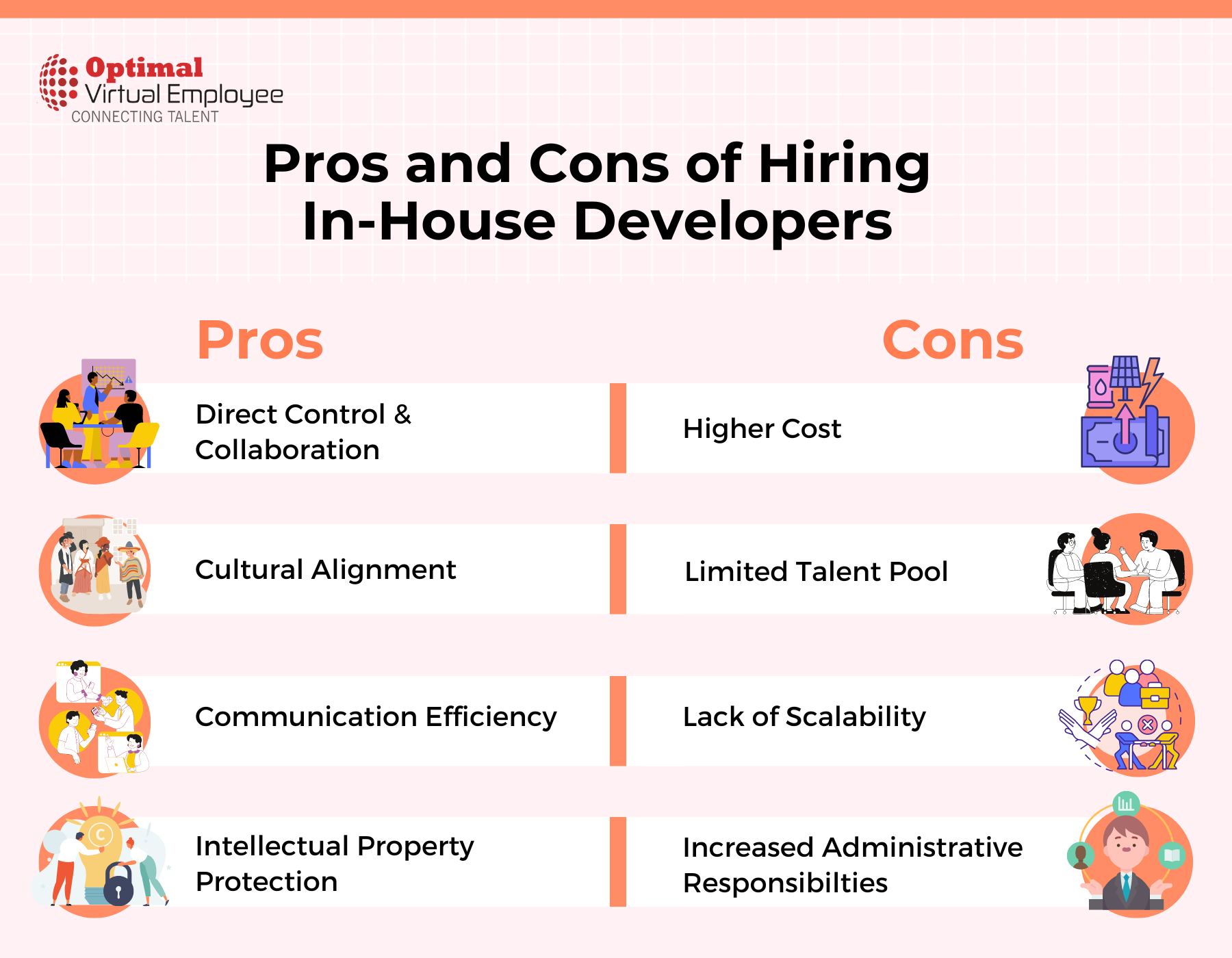Picture this: you’ve decided to create a website for your business or project, and now you’re faced with a decision that can make or break your online success. Do you hire an in-house web developer, with all the benefits and risks that come with a permanent employee? Or do you outsource the job to a third-party provider, with all the cost savings and potential pitfalls that come with working with a remote team? It’s a tough call, and there’s no one-size-fits-all answer.
CXOs, the esteemed leaders shaping the destiny of their organizations, find themselves at a crossroads, navigating the complex terrain of web development.
On one hand, the allure of an in-house team promises control, customization, and seamless integration with the company’s culture and vision. On the other hand, outsourcing web development brings the prospect of cost-effectiveness, specialized expertise, and the ability to tap into a global talent pool.
The question that keeps CXOs awake at night is: which path should they tread to unlock the full potential of their digital aspirations?
As the demand for captivating websites and innovative web applications continues to soar, CXOs find themselves faced with a multifaceted challenge: to build, or to outsource?
The answer lies in a thorough understanding of the advantages and disadvantages each option brings to the table. By weighing the pros and cons, CXOs can make an informed decision that aligns with their organizational goals, resources, and long-term vision.
But fear not, as we delve into the nitty-gritty of in-house vs outsourcing, we’ll help you weigh the pros and cons so you can make an informed decision that’s right for you.
6 Reasons Why You Should OUTSOURCE Your Web Development
In today’s digital age, having a strong online presence is crucial for any business. One of the key components of this online presence is a well-designed and functional website.
However, developing and maintaining a website can be a time-consuming and expensive process, especially for small businesses. This is where outsourcing your web development can be a game-changer.
Let’s quickly explore the top reasons why you should consider outsourcing your web development.
Cost savings:
One of the most significant advantages of outsourcing web development is cost savings. By outsourcing, you can reduce overhead costs associated with hiring and training an in-house team. Outsourcing also allows you to benefit from lower labour costs in other countries where the cost of living and wages are lower. This means that you can get high-quality web development services at a fraction of the cost.
Access to a pool of talented professionals:
When you outsource web development, you gain access to a vast pool of talented professionals who specialize in various areas of web development. This means that you can get the expertise you need to develop a top-quality website without having to hire a large team or invest in expensive training.
Faster turnaround time:
Outsourcing your web development allows you to get your website up and running faster. This is because outsourcing companies have the resources and expertise to handle large-scale projects quickly and efficiently. You can also benefit from the 24/7 availability of outsourced teams, which can help speed up the development process.
Flexibility:
Outsourcing web development offers you a level of flexibility that you cannot achieve with an in-house team. This is because outsourcing companies can easily scale up or down their services depending on your needs. This means that you can get the help you need when you need it, without having to worry about hiring or firing employees.
Focus on your core business:
Outsourcing web development allows you to focus on your core business while leaving the development of your website to experts. This means that you can concentrate on the areas of your business that you excel in, while still having a top-quality website that enhances your brand.
Reduced risk:
Outsourcing web development can help you reduce the risk associated with developing a website. This is because outsourcing companies have the expertise and resources to handle any issues that may arise during the development process. This means that you can rest assured that your website will be delivered on time, within budget, and with the highest quality standards.
6 Reasons Why You Should HIRE AN IN-HOUSE Web Developer?
When it comes to developing and maintaining a website, many businesses face a common dilemma: should they hire an in-house web developer or outsource the task to a web development agency?
Let us help you by exploring the benefits of hiring an in-house web developer and why it can be a smart investment for your business.
Direct Communication and Collaboration:
One of the primary advantages of hiring an in-house web developer is the ability to have direct communication and collaboration. In-house developers work closely with the different departments within your organization, such as marketing, design, and IT. This allows for better coordination and understanding of your business goals, resulting in a website that aligns perfectly with your brand identity and objectives.
Faster Turnaround Time:
When you have an in-house web developer, you can expect faster turnaround times for website updates, fixes, and new feature implementations. Since they are solely dedicated to your company, they can prioritize and address website-related issues promptly. This agility can be especially crucial during critical periods, such as product launches or marketing campaigns, where quick website updates are required.
Customization and Flexibility:
Outsourcing web development often involves using pre-designed templates or working within the limitations of the agency’s preferred tools and technologies. In contrast, an in-house web developer can provide greater customization and flexibility. They can tailor the website to your specific requirements, integrate custom features, and ensure that it reflects your unique brand identity.
Continuous Maintenance and Support:
Websites require regular maintenance, updates, and security enhancements to remain functional, secure, and up to date with industry standards. By having an in-house web developer, you ensure continuous support for your website. They can monitor and proactively address any issues, perform regular backups, and keep your website optimized for performance.
Cost-Effectiveness in the Long Run:
While hiring an in-house web developer may seem like a significant investment initially, it can prove to be cost-effective in the long run. Outsourcing web development projects can come with ongoing expenses, such as hourly rates or project-based fees. On the other hand, having an in-house developer means having a dedicated resource at a fixed cost, regardless of the number of projects or updates required.
Better Understanding of Your Business:
An in-house web developer becomes an integral part of your company, which means they have a deep understanding of your business goals, values, and target audience. This knowledge can significantly impact the web development process, as the developer will have insights into your specific requirements, branding guidelines, and industry trends. This understanding leads to a website that accurately reflects your company’s identity and resonates with your target market.
Pros And Cons Of Outsourcing And Hiring In-House Developers
In today’s digital era, businesses heavily rely on software development to innovate, streamline processes, and enhance customer experiences. When it comes to software development, organizations have two primary options: outsourcing or hiring in-house developers.
Each approach has its own set of advantages and disadvantages. We will delve into the pros and cons of both outsourcing and hiring in-house developers, helping you make an informed decision for your business.
Outsourcing Developers
Hiring In-House Developers:
Cost Comparison Between Outsourcing Vs In-House
In today’s competitive business landscape, companies often face the decision of whether to outsource certain functions or keep them in-house. One of the crucial factors influencing this decision is the cost.
This section aims to provide a comprehensive cost comparison between outsourcing and in-house operations, helping businesses make informed choices regarding their operational strategies.
Defining Outsourcing and In-house Operations:
Outsourcing: Explaining the concept of outsourcing, where a company delegates specific tasks or processes to external vendors or service providers.
In-house Operations: Describing the approach of keeping tasks and processes within the organization, utilizing internal resources and personnel.
Factors Affecting Costs:
Labor Costs: Analyzing the impact of labor costs on outsourcing and in-house operations, including wages, benefits, and training expenses.
Infrastructure and Overhead Costs: Examining the cost implications of maintaining infrastructure, equipment, technology, and other overhead expenses for both outsourcing and in-house operations.
Scalability and Flexibility: Discuss how the scalability and flexibility requirements of a business can affect cost considerations for outsourcing and in-house operations.
Cost Comparison Analysis:
Initial Investment: Evaluating the initial investment required for outsourcing versus establishing in-house operations, considering setup costs, infrastructure, hiring, and training.
Ongoing Operational Costs: Comparing the recurring costs associated with outsourcing and in-house operations, including labor, maintenance, technology, and other overhead expenses.
Cost Predictability and Control: Highlighting the differences in cost predictability and control between outsourcing and in-house operations, addressing the impact on budgeting and financial planning.
Hidden Costs and Risks:
Communication and Coordination: Discussing the potential challenges related to communication and coordination between an organization and its outsourcing partner, and their associated costs.
Quality Control: Examining the risks associated with maintaining quality standards in both outsourcing and in-house operations, and the cost implications of ensuring consistent quality.
Intellectual Property and Data Security: Addressing the cost considerations related to protecting intellectual property and maintaining data security in both outsourcing and in-house operations.
Decision Framework:
Offering a decision-making framework for businesses to assess their unique needs, weighing the costs and benefits of outsourcing versus in-house operations.
Providing guidelines and factors to consider when making the final decision, including strategic objectives, core competencies, risk tolerance, and long-term sustainability.
By thoroughly comparing the costs associated with outsourcing and in-house operations, businesses can make informed decisions that align with their financial goals and operational requirements.
While cost considerations are crucial, it’s essential to also evaluate other factors such as quality control, risk management, and strategic alignment when determining the most suitable approach for a particular business scenario.
Qualifications When Sourcing A Web Developer [Online/In-Person]
When it comes to sourcing a web developer, whether online or in-person, it’s essential to consider several qualifications to ensure that you choose the right candidate for your project.
Here are some key qualifications to look for when sourcing a web developer:
Technical Skills: A web developer should have excellent technical skills and be proficient in various programming languages such as HTML, CSS, JavaScript, PHP, and others, depending on the project’s requirements. Additionally, they should have experience with web development frameworks and content management systems (CMS), such as WordPress, Drupal, or Joomla.
Experience: Look for a web developer who has experience working on projects similar to yours. They should have a portfolio of their previous work, which should demonstrate their expertise in the field.
Communication Skills: A web developer must be an excellent communicator, both verbally and in writing. They should be able to explain technical concepts in simple terms, listen to your ideas and requirements, and offer suggestions and advice.
Problem-Solving Skills: Look for a developer who is a critical thinker and can solve problems quickly and efficiently. They should be able to anticipate potential problems and suggest solutions to avoid them.
Attention to Detail: A web developer should be detail-oriented and take pride in their work. They should be able to ensure that their work is pixel-perfect, and that everything works as expected.
Project Management Skills: Web developers should be able to manage their time and resources effectively. They should be able to prioritize tasks, meet deadlines, and deliver the project on time and within budget.
Professionalism: Web developers should be professional in their conduct and approach. They should be punctual, responsive, and able to work collaboratively with your team.
Making the Right Choice: Outsourcing vs. In-House Hiring for Your IT Needs
Both outsourcing and in-house hiring have their own unique advantages and disadvantages. The choice between the two ultimately depends on your company’s specific needs, goals, and resources.
Outsourcing offers cost efficiency, access to specialized skills, scalability, and the ability to focus on core competencies. It allows you to tap into a global talent pool, leverage external expertise, and achieve significant cost savings. However, it also comes with challenges such as communication barriers, potential loss of control, data security concerns, and the need for careful vendor selection and management.
On the other hand, in-house hiring provides direct control, immediate response, and seamless communication. It allows for greater integration with company culture, knowledge sharing, and long-term cost predictability. Additionally, it offers enhanced data security and intellectual property protection. However, building an in-house team involves higher upfront costs, recruitment and training efforts, and limited access to specialized skills or immediate scalability.
When deciding between outsourcing and in-house hiring for your IT needs, consider factors such as the nature of the project, budget constraints, timeline requirements, and the availability of local expertise. Conduct a thorough analysis of the potential risks and benefits associated with each option. It may also be worthwhile to explore hybrid models, such as a blended approach combining in-house and outsourced resources, to optimize efficiency and maximize outcomes.
Ultimately, the key to success lies in carefully evaluating the trade-offs and aligning your decision with your company’s long-term strategy. By leveraging the advantages of outsourcing or in-house hiring, you can enhance your IT capabilities, drive innovation, and achieve your business objectives effectively.















